Discover the hidden gem of Egypt's heritage: the Qalawun Complex! Unravel the mystique surrounding its intricate architecture and delve into its historical legacy.
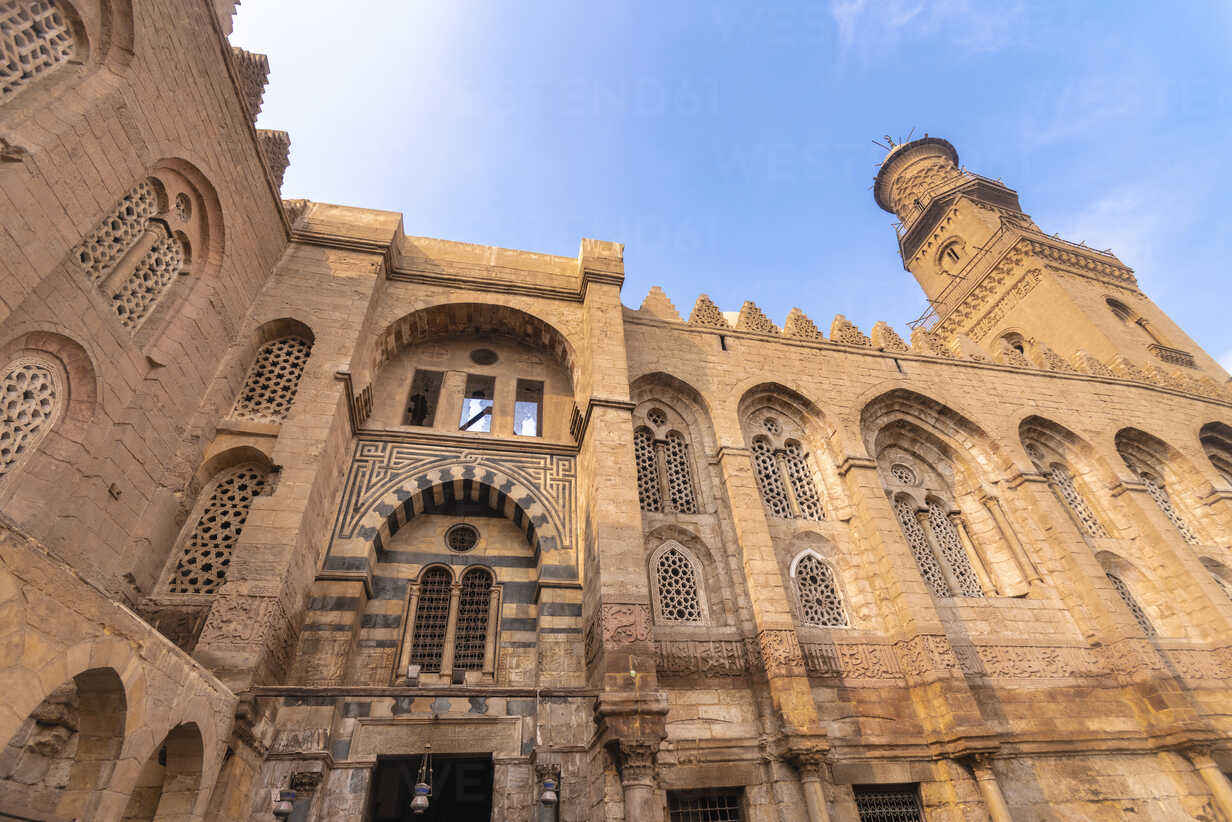
| Overview | |

|
|
| Location | Al Muizz Street, Cairo |
| Built | 1285 |
| Builder | Sultan Qalawun as Salihi |
| Purpose | Religious Hub |
| Architecture | Multifunctional |
| Significance | Historical Landmark |
The Phenomenal Qalawun Complex is a gemstone of creativity, art, and enlightenment that played a significant role in the founding of Islamic Cairo during the Mamluk period. It was the biggest Islamic monument in Cairo, which gained fame for its size and the richness of its epic architecture and design, which was filled with a madrasa, hospital, and mausoleum. It acted as a center for the culture of Egypt that spanned over 300 years.
This artistic masterpiece has been the source of many interesting facts and stories of the Mamluk culture and history, plus the noticeable architecture that has left an enchanting effect on the golden streets and districts of Cairo.
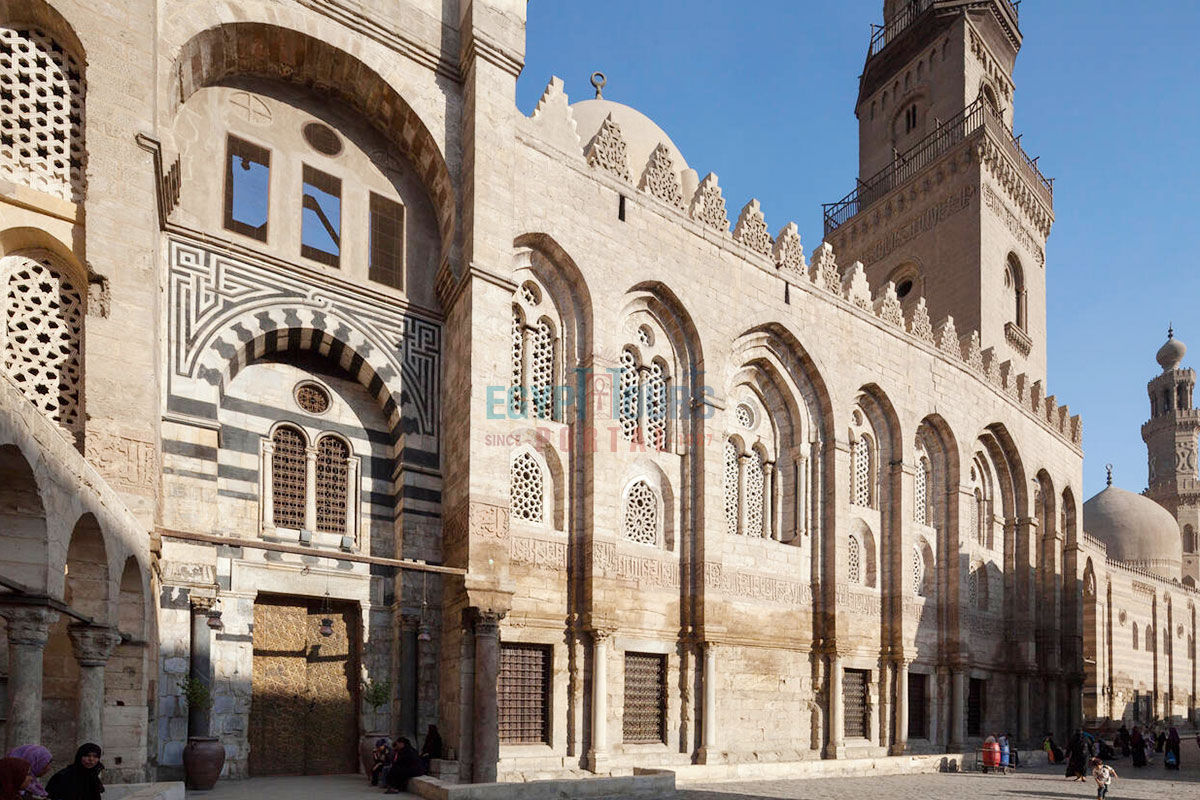
Qalawun as Salihi had the title of Qalawun the victorious, who was the 7th Bahri Mamluk sultan who reigned from 1279 to 1290 AD. He came into power after Sultan Barakah, who some believed was involved in his exile and even his death. During his life, he had many wives and children, sons and daughters who solidified his political connections. His first wife was known as Fatima Khatun, who bore his eldest son Salih Ali. Qalawun is renowned for his leading a number of successful campaigns against the Crusaders, where he took control of lands from Tripoli county and a massive Crusader stronghold known as besieging. He descended from the ancient Turkish people, who were later drafted as mamluk warriors in the 1240s.
He gained the title of al-Alfī as he was purchased for a thousand dinars of gold. He was able to learn Arabic and climb the ranks where he served under Sultan Baibars and even married his daughter. Later on, he took control of the sultanate after a revolt and political maneuvering. He had many challenges during his reign, such as defeating a rival from Damascus known as Sunqur Al Ashqar, who was defeated in 1280, and made an alliance with many empires like the Byzantines to resist any type of foreign threats. He also established a number of trade alliances and diplomatic relationships with the Kingdom of Sicily and the Republic of Genoa.
He continued to strengthen his power by capturing great fortresses and cities like Margat, Maraclea, Latakia, and Tripoli. His son al-Ashraf Khalil continued his legacy by taking over the city of Acre after the violence committed by King Henry's reinforcements on the city in 1290. After his death in 1290, his son continued his father’s policies, which caused many internal conflicts that led to his assassination by the Turks in 1293.
Qalawun Complex is found at Bayn al-Qasrayn on al-Mu'izz Street which is found near Khan El Khalili Bazaar and can reached with ease by hiring a travel agency that will provide a state-of-the-art vehicle with a seasoned driver who knows his way around old Cairo plus a tour guide will be present to showcase the history and culture of all the amazing artistic monuments across the golden routes of Cairo.
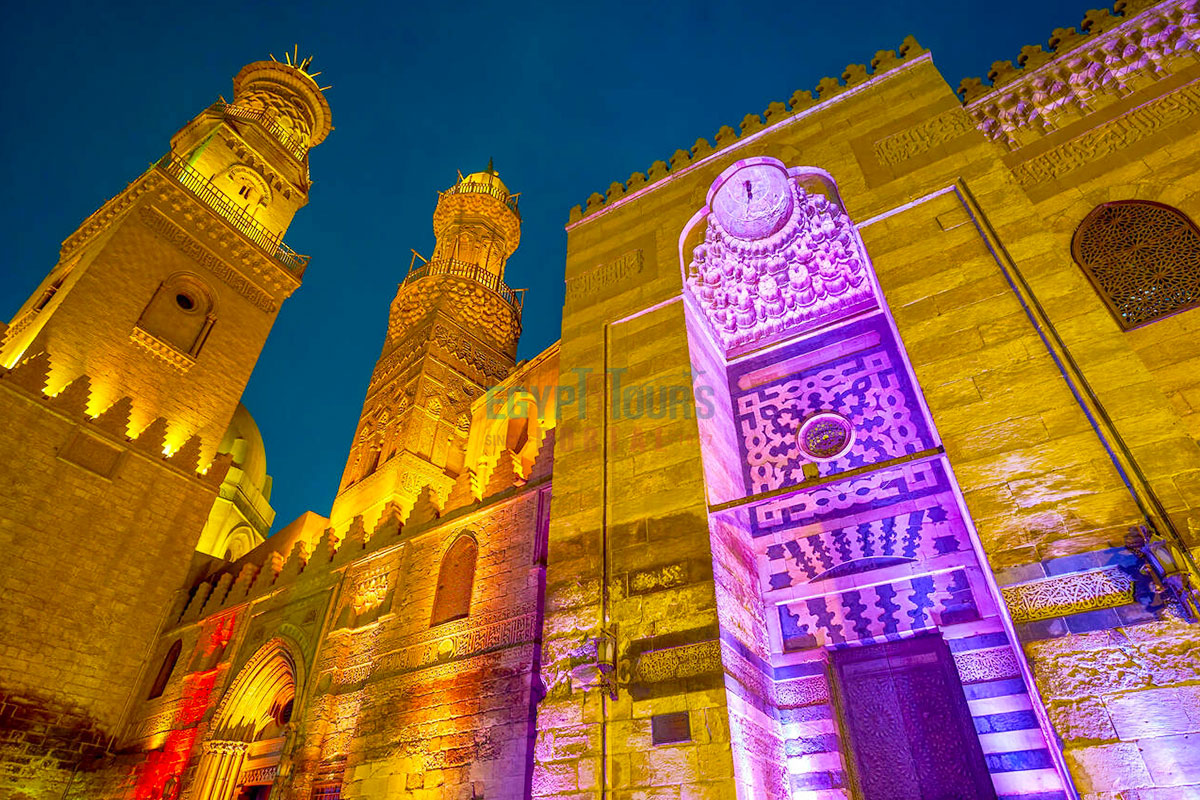
The majestic Qalawun Complex was established around 1285 on the ruins of an ancient Fatimid western palace, which took five years to complete after uniting his power and winning a number of battles against the Mongols in the lands of Syria. Since its creation, the complex was a key factor in many Islamic courts and religious ceremonies which was seen as a vital religious and cultural center from the times of the Mamluk dynasty to the Ottoman Empire. It was a key player in Cairo's prosperity from the 13th and 16th centuries.
Many architectural specialists have classified the structure as pious complexes that have many multifunctional purposes that are able to display many signs of wealth and legitimacy. The Sultan Qalawun funerary complex held a hospital, mausoleum, and madrasa, which were built around 13 months, from 1284 to August 1285. It was established in size and complexity. It was established with the help of forced labor, passers-by, builders, and Mongol prisoners of war.
Discover top Islamic landmarks in Egypt and delve into the history of Islam’s journey to and impact on Egypt. Read more here.
Read MoreThe complex was made to be a beautiful construction that acted as a marvelous building at its time. It was taken from Qalawun's master's palace and citadel. Around 1302 AD, the earthquake that happened at the time caused a restoration campaign of the complex, and again in 1776 AD an Ottoman Sabil was on the opposite side of the street. In the 19th century, the complex was extremely famous for being the most magical example of Arabic architecture. A number of drawings were made in 1817 that redefined and modernized the structure's angles and reflected a contemporary urban perspective.
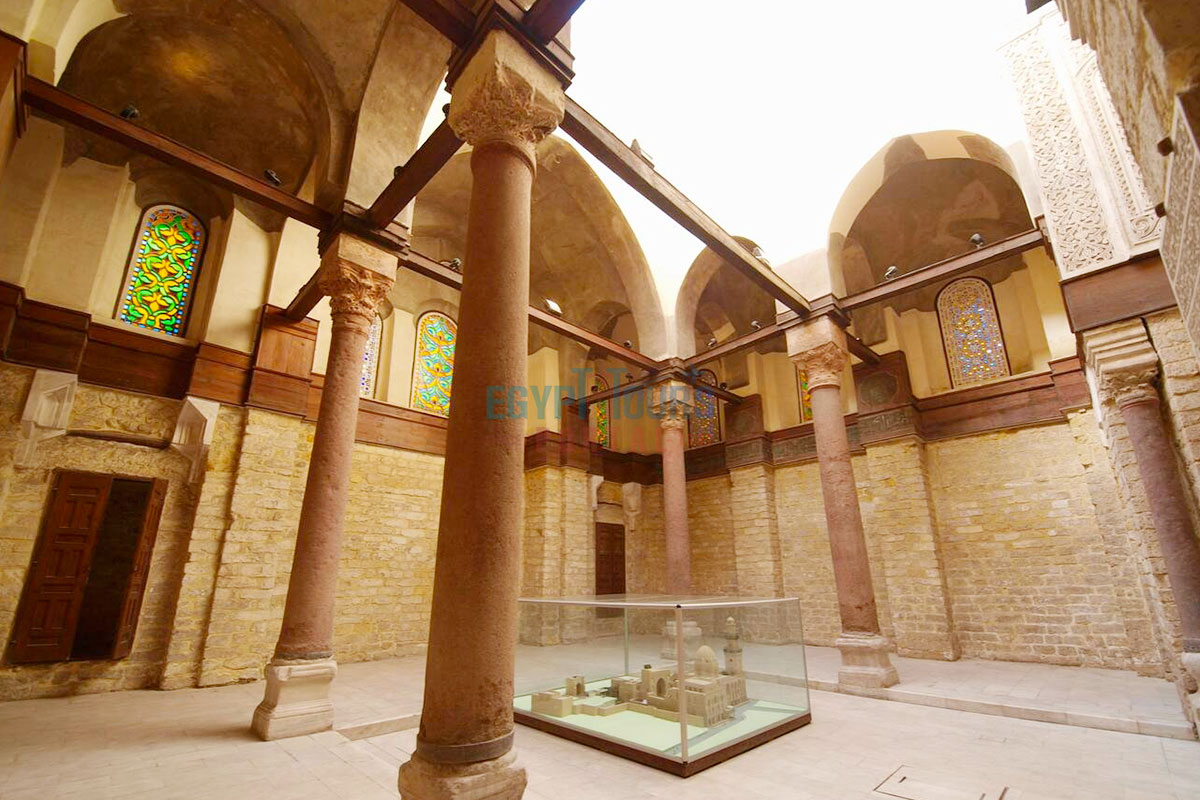
The architecture of the Qalawun Complex had many benefits as it was viewed as a multifunctional masterpiece that was made of a tomb, mosque, madrasa, and a hospital, which were all arranged around a central corridor. When entering a horseshoe-arched portal, there is a cruciform madrasa on the left side, which contains a marvelous open court filled with a central pool. The corridor which is found beyond the madrasa is able to support the minaret and is covered with a great wooden ceiling, which makes some sort of dim lighting.
The mausoleum is located between the madrassa of Sultan Barquq and the entrance passage, which contains the remains of Sultan Qalawun and his son Al Nasir. The qibla wall is found on the two sides of the prayer iwan and the mausoleum that is known to face the street. The hospital is found at the rear side of the long corridor. The Qalawun Complex exterior is a true representation of mamluk architecture as seen in the marvelous prayer hall of the madrasa which extends into the streets and displays the complex’s importance. The madrasa minaret is made of three stories and is found near the entrance. It displays a fake papyrus cornice from the Pharaonic rule that served to legitimize the authority of the Mamluk period.
The complex façade is able to explore similarities to the crusader or gothic styles. The exterior is made of ashlar blocks and pointed-arched panels of varying sizes enclosing single windows. The entrance is made of a great rounded arch that is enclosed with a pointed arch with black-striped voussoirs, geometric motifs across the spandrels, and a majestic grilled double window with a marvelous oculus. The coupled window and the oculus have elements that are echoed in the entrance portal of the mausoleum which is adorned with amazing intricate stucco work. The mausoleum and the facades of the mausoleum are connected through a gilded amazing inscription of the marvelous complex’s founder and important dates which are related to its epic construction.
The Interior of the complex is made of an important madrasa and mausoleum that is located in front of its other in the corridor with the hospital found at the corridor’s end which leads all the way to a rectangular court. There are a number of amazing Iwans that can be found within the complex in both the grand complex courtyard and the courtyard of the hospital. The interior walls are adorned with many marble mosaics and intricately carved stucco, but the ceilings are gilded painted wooden coffers. The floors contain opus sectile designs and the mihrab that are decorated with marvelous glass mosaic. It is able to establish a visually stunning and spiritually significant interior environment found within the amazing Qalawun complex.
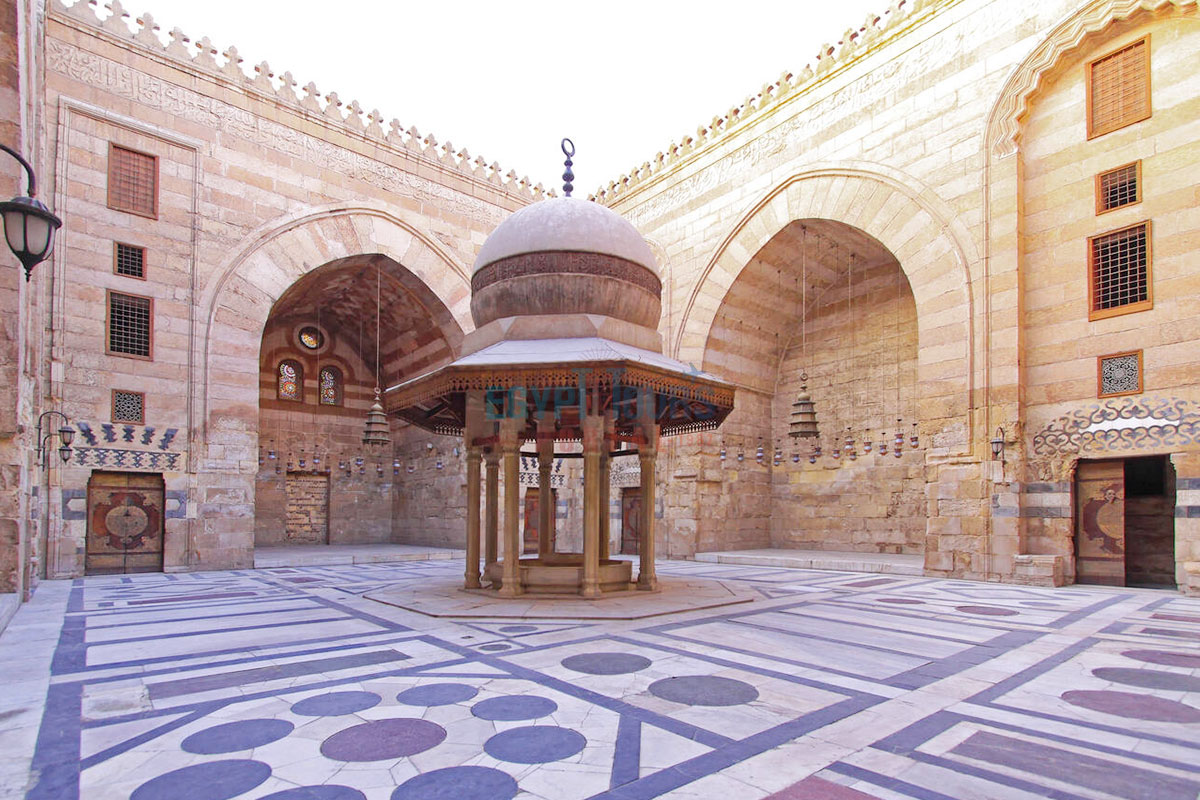
The mausoleum of the Qalawun Complex acted as the final resting place of Sultan Qalawun and his son al-Nasir Mohammed. The design of the mausoleum featured a rectangular layout made of four piers and columns which creates an octagon. There is a high drum above it, and its axis corresponds with a very large bay that is located near the grand entrance that features Corinthian capitals across the columns. There are also many intricate inscriptions found across the walls. The prayer niche is seen as the most lavish aspect of the mausoleum. Its dome served as a ceremonial center for emirs which symbolized power transfer during the Mamluk period. This dome was destroyed by an Ottoman governor but was then replaced later on.
The madrasa played a great role in elevating the state of Islamic education as it housed many teachings, which included four legal schools of Islamic law, Hadith, medicine, and many more. It contained student cells on the eastern side, two great two Iwans, and a marble-paved courtyard. The façade held incredible inscriptions, similar to those in the mausoleum. The central arches are known to have two tiers of wonders, plus their façade is able to shed light on the central arch, which contains smaller arches found on each side. The mihrab of the madrasa contains a distinctive horse-shoe arch which is decorated with mother-of-pearl and glass mosaics that feature a rich red color plus many different naturalistic designs.
Enjoy a day trip to Islamic Cairo from Cairo and witness the best mosques & Islamic sights in Cairo with an expert tour guide. Read more!!!
Read MoreThe hospital acted as an important medical institution that offered the best shelter, clothing, medicare, food, and drugs for over 500 years. The hospital remained functional until the late Ottoman period, before its demolition in 1901. It held many important documents and records that offered informative insight into its functions that centered around research, medical treatment, and education. The construction of the hospital came from Sultan Qalawun's vow after he was healed from his illness at the Bimaristan of Nur ad-Din in Damascus. The entrance of the hospital had an L-shaped corridor that separated the madrasa from the mausoleum. It contained 2 axes found at the right angles to each other. The hospitals contained 4 iwans that were filled with many rooms with many latrines, storage areas, sick wards, and mortuaries. The biggest Iwan contained stucco ornamentation, which resembles many other important Mamluk structures.
The miraculous Qalawun Complex is a heavenly wonder that stands as a cultural and architectural achievement of the Mamluk era that left an enchanting footprint on the rich Islamic architecture, which can shed light on the magnificent history of this time period that lasted for centuries. You can now enjoy an unforgettable tour of that prestigious Islamic site in addition to so many fabulous attractions in Cairo while being in Egypt by choosing one of our Cairo day tours, and that is how you will enjoy the most fabulous historical, cultural, and entertaining vacations in Egypt so contact us now and start your lifetime adventure.
Cairo Stopover Tour Cairo stopover tour is the ultimate portal for exploring the mos...
Tour Location: Cairo/Giza...
Day Tour in Cairo and The Pyramids Day tour in Cairo and the Pyramids is a gift from...
Tour Location: Cairo/Giza...
Day Trip to Pyramids from Cairo Day trip to the Pyramids from Cairo is a journey acr...
Tour Location: Giza...
Saqqara & Memphis Tour from Cairo Saqqara & Memphis tour from Cairo wil...
Tour Location: Memphis and Sakkara...
The complex façade is famous for its stunning and visually striking exterior, which is made of intricate Islamic calligraphy, geometric patterns, decorative elements, and the extensive use of colorful stones and tiles, which are able to explore similarities to the crusader or gothic styles.
The entire country of Egypt deserve to be explored with its every heavenly detail but there are places that must be seen before any other such as the breathtaking Hurghada's red sea, The wonders of Cairo the pyramids of Giza, the great sphinx, the Egyptian Museum, Khan El Khalili Bazaar, the wonders of Luxor like Valley of the Kings, Karnak & Hatshepsut temple and the wonders of Aswan such as Abu Simbel temples, Philea temple, Unfinished obelisk and The Wonders of Alexandria like Qaitbat Citadel, Pompey's Pillar and Alexandria Library. Read more about the best places to visit in Egypt.
If you want to apply for a Visa On Arrival that lasts for 30 days then you should be one of the eligible countries, have a valid passport with at least 6 months remaining and pay 25$ USD in cash, as for the E-Visa for 30 day you should have a valid passport for at least 8 months, complete the online application, pay the e-visa fee then print the e-visa to later be presented to the airport border guard. You could also be one of the lucky ones who can obtain a free visa for 90 days. Read more about Egypt travel visa.
Egypt has a variety of delicious cuisines but we recommend “Ful & Ta’meya (Fava Beans and Falafel)”, Mulukhiya, “Koshary”, a traditional Egyptian pasta dish, and Kebab & Kofta, the Egyptian traditional meat dish.
The best time to travel to Egypt is during the winter from September to April as the climate becomes a little tropical accompanied by a magical atmosphere of warm weather with a winter breeze. You will be notified in the week of your trip if the Climate is unsafe and if any changes have been made.
You should pack everything you could ever need in a small bag so you could move easily between your destinations.
We have been creating the finest vacations for more than 20 years around the most majestic destinations in Egypt. Our staff consists of the best operators, guides and drivers who dedicate all of their time & effort to make you have the perfect vacation. All of our tours are customized by Travel, Financial & Time consultants to fit your every possible need during your vacation. It doesn't go without saying that your safety and comfort are our main priority and all of our resources will be directed to provide the finest atmosphere until you return home.
You will feel safe in Egypt as the current atmosphere of the country is quite peaceful after the government took powerful measures like restructuring the entire tourist police to include all the important and tourist attractions in Egypt. Read more about is it safe to travel to Egypt.
Wear whatever feels right and comfortable. It is advised to wear something light and comfortable footwear like a closed-toe shoe to sustain the terrain of Egypt. Put on sun block during your time in Egypt in the summer to protect yourself from the sun.
The best activity is by far boarding a Nile Cruise between Luxor and Aswan or Vise Versa. Witness the beauty of Egypt from a hot balloon or a plane and try all the delicious Egyptian cuisines and drinks plus shopping in old Cairo. Explore the allure and wonders of the red sea in the magical city resorts of Egypt like Hurghada and many more by diving and snorkeling in the marine life or Hurghada. Behold the mesmerizing western desert by a safari trip under the heavenly Egyptian skies.
There are a lot of public holidays in Egypt too many to count either religious or nation, the most important festivals are the holy month of Ramadan which ends with Eid Al Fitr, Christmas and new years eve. Read more about festivals & publich holidays in Egypt.
Egypt is considered to be one of the most liberal Islamic countries but it has become a little bit conservative in the last couple of decades so it is advised to avoid showing your chest, shoulders or legs below the knees.
Arabic is the official language and Most Egyptians, who live in the cities, speak or understand English or at least some English words or phrases. Fewer Egyptians can speak French, Italian, Spanish, and German. Professional tour guides, who work in the tourism sector, are equipped to handle visitors who cannot speak Arabic and they will speak enough English and other languages to fulfill the needs of all our clients.
The fastest way is a car, of course, a taxi. If you are in Cairo ride a white taxi to move faster or you could board the fastest way of transportation in Egypt metro if the roads are in rush hour.
The temperature in Egypt ranges from 37c to 14 c. Summer in Egypt is somehow hot but sometimes it becomes cold at night and winter is cool and mild. The average of low temperatures vary from 9.5 °C in the wintertime to 23 °C in the summertime and the average high temperatures vary from 17 °C in the wintertime to 32 °C in the summertime. The temperature is moderate all along the coasts.
It is the home of everything a traveler might be looking for from amazing historical sites dating to more than 4000 years to enchanting city resorts & beaches. You will live the vacation you deserve as Egypt has everything you could possibly imagine.









